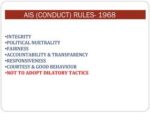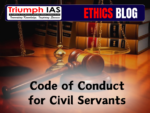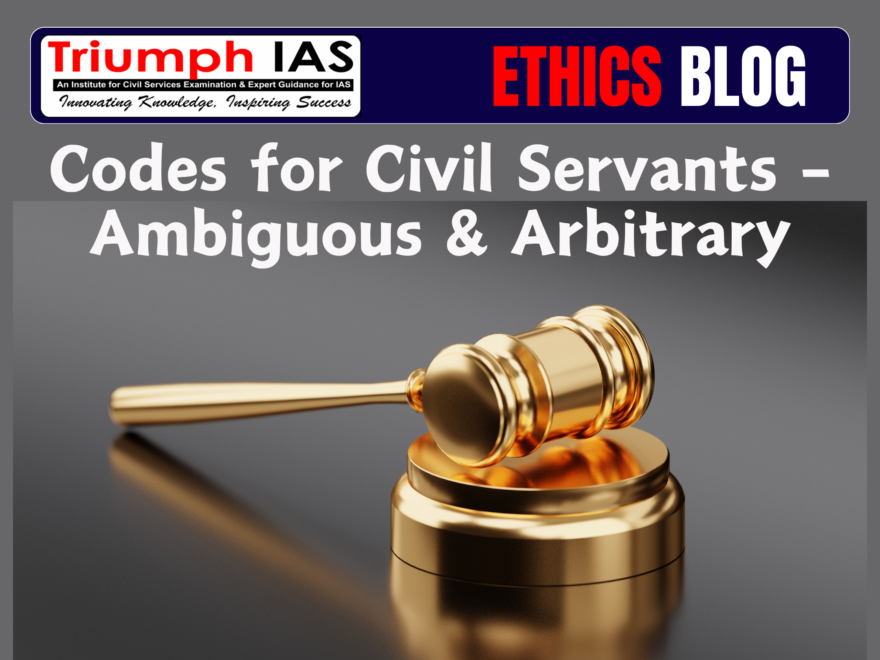Codes for Civil Servants – Ambiguous & Arbitrary
[Relevant for Public Ethics, Integrity and Aptitude]

Even Bribe-Taking for CS is Punishable Offence
There are two sets of rules for civil servants – one for All India Services and the other for Central Civil Services. Specially designed Conduct Rules govern an officer’s behaviour and conduct.
The AIS Conduct Rules, 1968 and CCS Conduct Rules, 1964 are mostly similar. These were framed based on recommendations from a committee constituted by then Minister of Home Affairs Lal Bahadur Shashtri in 1962. This Committee was headed by K Santhanam MP (RS).
The Conduct Rules cover a wide range of issues, from the ambiguous idea of personal integrity to more specific actions.

For instance, Rule 3(1) states that “Every member of the Service shall at all times maintain absolute integrity and devotion to duty and shall do nothing which is unbecoming of a member of the Service.” This rule is purposefully vague and can be applied to individuals in cases of any kind of wrongdoing, even if the allegations are not covered under any more specific rules. For example, while promotion of casteism is not covered under any specific Conduct Rules, casteist behaviour can be interpreted as “unbecoming of a member of the Service” under Rule 3(1).
On the other hand, Rule 4(1) of the AIS Conduct Rules is more specific. It states, “No member of the Service shall use his position or influence directly or indirectly to secure employment for any member of his family with any private undertaking or Non- Government Organisation.”
Rule 5(1) states, “No member of the Service shall be a member of, or be otherwise associated with, any political party or any organization which takes part in politics, nor shall he take part in, or subscribe in aid of, or assist in any other manner, any political movement or political activity.” But, in recent days, it has been seen that without following a strict “cooling-off” period of minimum 3 years after leaving service or taking VRS, the CS joins political party and even contest elections, this rule is only good in paper. Infact, recently a Calcutta HC sitting judge took VRS and then contested the 2024 General Election from WB. This puts a lots of doubt in the minds of the citizen as far as their functioning while they were CS or PS.
Rule 5(4) states, “No member of the Service shall canvas or otherwise interfere with, or use his influence in connection with, or take part in, an election to any legislature or local authority.” While members can hold personal political beliefs, these rules restrict the degree to which they can act on them.
Rule 7 of AIS Rules states, “No member of the Service shall, in any radio broadcast or communication over any public media or in any document published anonymously, pseudonymously or in his own name or in the name of any other person or in any communication to the press or in any public utterance, make any statement of fact or opinion, — Which has the effect of an adverse criticism of
- any current or recent policy or action of the Central Government, or
- any current or recent policy or action of the State Government; or
- which is capable of embarrassing the relations between the Central Government and any State Government; or
- which is capable of embarrassing the relations between the Central Government and the Government of any Foreign State.”
However, civil servants are allowed to express their opinion on official files and other official documents and can even talk to the media during field postings. What they can tell the media, though, is restricted to their job or some specific event/issue. Personal beliefs on wider issues are not to be aired.
Taking dowry is banned but seemingly common.
Dowry is an evil which afflicts all of society. Civil servants are no exception.
Often, once selected to the services, officers receive numerous marriage offers. Influential families, including big political ones, covet civil servants as husbands for their daughters and are willing to pay a big price to win their hand in marriage. A civil servant’s job security, status and perks received plays a major role in inflating dowry demands.
But as far as rules are concerned, both giving and receiving dowry is strictly prohibited. Rule 11 (1-A) of the AIS Rules on “Giving or taking of dowry” states, “No member of the Service shall— (i) give or take or abet the giving or taking of dowry; or (ii) demand, directly or indirectly, from the parents or guardian of a bride or bridegroom, as the case may be, any dowry.”
In fact, any “big” gift a civil servant receives needs to be reported.
Rule 11(1) states, “A member of the service may accept gifts from his near relatives or from his personal friends having no official dealings with them, on occasions such as wedding, anniversaries, funerals and religious functions when the making of gifts is in conformity with the prevailing religious and social practice, but he shall make a report to the Government if the value of such gift exceeds Rs.25,000.”
The threshold of Rs 25,000 was last fixed in 2015.
There are similar provisions for polygamy and certain specific provisions as per conduct rules, which are more stringent than IPC sec 498(A) for any domestic violence case.
Rules are amended and added from time to time.
While Conduct Rules penned in the 1960s are still being followed, these are never static, with updates made from time to time.
For instance, with regard to Rule 5(1), the government, from time to time, determines whether a particular organisation is political or not. Interestingly, such clarifications have been repeatedly made about the Rashtriya Swayamsevak Sangh (RSS) with rules stating that its activities are political in nature.
The Narendra Modi government added a few sub-rules in August 2014. For instance, the following was added to the Conduct Rules:
- Every member of the Service shall maintain:- high ethical standards, integrity and honesty; political neutrality; accountability and transparency; responsiveness to the public, particularly to the weaker section; courtesy and good behavior with the public” among other things.
- Every member of the Service shall maintain integrity in public service; take decisions solely in public interest and use or cause to use public resources efficiently, effectively and economically;
- declare any private interests relating to his public duties and take steps to resolve any conflicts in a way that protects the public interest;
- not place himself under any financial or other obligations to any individual or organisation which may influence him in the performance of his official duties;
- not misuse his position as civil servant and
- not take decisions in order to derive financial or material benefits for himself, his family or his friends;
- act with fairness and impartiality and not discriminate against anyone, particularly the poor and the under-privileged sections of society;
- perform and discharge his duties with the highest degree of professionalism and dedication to the best of his abilities”.
#EthicsBlogoTerms
Related Blogs …
 |
 |
Follow us :



Find More Blogs…
| Compare and contrast Karl Marx’s and Max weber’s | Karl Marx- Historical Materialism |
| Position of Women In the Modern Indian Society | Sociology: Social system and pattern variables |



One comment